Artificial Intelligence in the Oil and Gas Industry: Benefits & Use Cases
AI
5 MIN READ
October 25, 2024
![]()
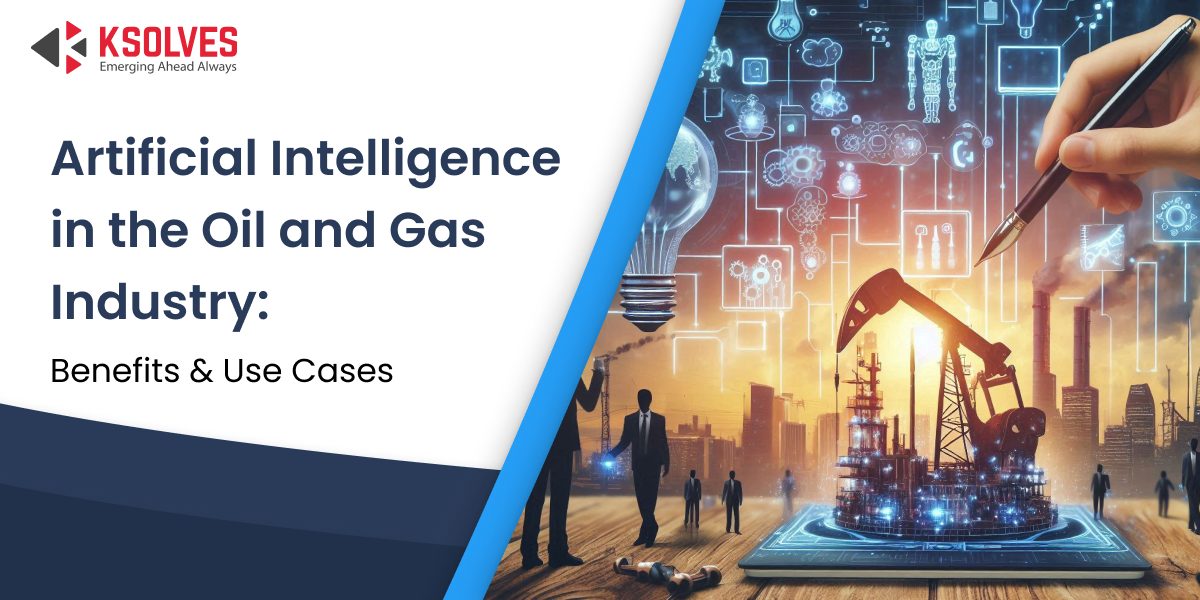
The oil & gas industry making its paradigm shift that is more cautious rather than innovative. From onshore to offshore to petrochemical to LNG plants, the safety of the workers in this sector is more crucial than ever and continuity of production prevents critical asset failures.
Don’t you think, overcoming the circumstances in this industry needs a right analytical approach to stay ahead?
To grow rapidly and sophisticatedly, AI is all we need to have.
When it comes to a solution that works across numerous industries in 2024, AI always comes to mind. Not because of this popularity but its works that make a paradigm shift in decision-making. Conceptually, if we understand this term, then it is one of those machines in human intelligence form that displays learning, reasoning, and self-correction capabilities.
AI has begun its journey starting from simplistic rule-based algorithms and has advanced itself to complex neural networks and ML, capable of processing and learning massive data.
When we talk about Artificial Intelligence in the oil and gas industry, its entry has achieved a significant milestone as this sector relied on physical labor to focus on decision-making. The AI’s ability to analyze a massive amount of datasets, predict outcomes, and automate complex business processes is advantageous to deal with challenging environments, and fluctuating market dynamics.
As per the survey conducted, the executives have found that those who started using AI helped to solve organizational challenges and it’s easy to understand. The market size of AI in the oil and gas market was worth around $3.19 million in 2023 and is expected to grow to around $9.34 million by 2032. It is also growing at a component annual growth rate (CAGR) between 2024 and 2032 is around 12.80%. Let’s explore how artificial intelligence affects the oil and gas industry.
What and Why AI in the Oil and Gas Industry?
When it comes to choosing AI development services, we can see that AI offers various applications in this spectrum, starting from planning to surveys to forecasting and support functions.
Whether it is about utilizing AI tools for oil production, improving safety for employees, or transportation, AI there works on solving several challenges. Enterprises that enjoy automated and enhanced data-rich reduce business risks. Utilizing AI improves business productivity, better efficiency from old resources, and more value addition to the supply chain that explores the new resources.
Artificial Intelligence Use Cases in the Oil and Gas Industry
-
Exploration and Reservoir Management
AI is transforming the exploration process by analyzing vast amounts of seismic and geological data to identify potential oil and gas reservoirs more accurately. Machine learning algorithms can model subsurface geology, reducing the need for extensive drilling and enabling more precise decision-making in locating resources. AI also helps optimize reservoir management by predicting fluid flow, enhancing recovery rates, and extending the life of reservoirs.
-
Predictive Maintenance
AI-powered predictive maintenance systems are helping companies reduce unplanned downtime and maintenance costs by analyzing sensor data from equipment such as pumps, turbines, and pipelines.
By identifying early signs of equipment failure, AI enables timely maintenance and repairs, thus minimizing the risk of costly disruptions and extending the lifespan of critical assets.
-
Drilling Optimization
AI is used to optimize drilling operations by processing real-time data to improve drilling speed, accuracy, and safety. AI algorithms analyze factors such as pressure, temperature, and rock properties to guide drilling decisions, helping to minimize risks, reduce drilling time, and lower operational costs.
In complex drilling environments, AI can provide predictive analysis that improves overall well performance.
-
Supply Chain Optimization
In the oil and gas sector, AI optimizes supply chain processes by forecasting demand, managing inventory, and improving logistics operations.
AI-driven solutions analyze historical data, weather conditions, and market trends to predict supply chain disruptions and adjust logistics accordingly. This improves resource allocation, reduces delivery delays, and ensures a more efficient supply chain flow.
-
Health, Safety, and Environment (HSE) Monitoring
AI enhances safety in the oil and gas industry by monitoring real-time data from field operations, equipment, and personnel. AI systems detect potential hazards such as gas leaks, equipment malfunctions, or unsafe working conditions, allowing companies to take proactive safety measures.
Additionally, AI can track compliance with environmental regulations by analyzing emissions and waste management data, contributing to improved sustainability efforts.
-
Production Forecasting and Optimization
AI models are employed to forecast production rates by analyzing historical production data and operational parameters. These AI-driven insights enable oil and gas companies to optimize production schedules, manage field operations more efficiently, and adjust strategies in response to fluctuating market demands.
AI-based production optimization also assists in reducing energy consumption and maximizing resource utilization.
-
Autonomous Inspection and Monitoring
AI-driven drones and robots are increasingly being deployed for autonomous inspection and monitoring of oil and gas infrastructure, such as pipelines, offshore platforms, and refineries.
These AI-powered systems can identify leaks, corrosion, and other structural issues in real-time, reducing the need for human intervention in hazardous environments. This improves safety, speeds inspection processes, and lowers overall operational costs.
-
Emissions Monitoring and Environmental Compliance
With increasing pressure to minimize environmental impact, AI solutions are used to monitor and reduce emissions in oil and gas operations.
AI models analyze data from emission sensors to track greenhouse gas emissions, optimize fuel consumption, and detect any deviations from environmental regulations. This enables companies to stay compliant while adopting more sustainable practices.
Use Cases of Artificial Intelligence in the Oil and Gas Industry
- Exploration and Reservoir Management
- Predictive Maintenance
- Drilling Optimization
- Supply Chain Optimization
- Health, Safety, and Environment (HSE) Monitoring
- Production Forecasting and Optimization
- Autonomous Inspection and Monitoring
- Emissions Monitoring and Environmental Compliance
Benefits of AI Utilization in the Oil and Gas Industry
From improving safety and enhancing business operations, AI comes up with several advantageous roles to transform across various sectors. These benefits automatically improve decision-making, bring efficiency and productivity, and directly impact the oil and gas industry. Let’s explore them:
-
Improves Decision-Making Process
For deep data analytics, AI analyzes the decision-making across different aspects of the oil and gas value chain. Moving from observation to production and distribution, AI directly impacts the companies to optimize operations.
Still thinking….. What’s different in this?
The major aspect of AI is the cost-saving that helps to identify the latest opportunities as per marketing tasks and reduces risks.
-
Mitigate Environmental Issues
Another integrated benefit of AI is that it assists in detecting oil spills and hydrocarbon leaks by identifying the data and satellite imagery. This quick detection strategy automates the instant business response, reduces the effect on the environment, and cleans up the additional costs.
This, in contrast, directly supports the sustainable practices running in the oil and gas industry.
-
Continuous Innovation and Improvement
AI-driven business insights enforce the culture of innovation to analyze the data and identify the areas of improvement. The ongoing optimization of processes and operations pinpoints the inefficiencies and suggests enhancements with AI.
It directly leads to the development of the latest business technologies and solutions and also ensures firms play at the forefront as per the industry advancements. Hence, leveraging AI helps businesses adapt to changing market conditions and maintain a competitive advantage.
-
Cost-Effective Strategic Approach
Whether we talk about AI in the oil and gas industry or any other industry, all it comes to gaining tremendous profit, that’s all businesses are about. Reducing the operational cost, a factor of predictive maintenance minimizes downtime and repair expenses while maintaining the production schedules.
As the automation of routine maintenance works at the forefront, it will reduce labor costs and improve accuracy contributing to cost savings.
AI’s Advantageous Role in the Oil and Gas Industry
- Improves Decision-Making Process
- Mitigate Environmental Issues
- Continuous Innovation and Improvement
- Cost-Effective Strategic Approach
Evolution of AI in the Oil and Gas Industry – How Ksolves Leads the Way?
We have understood how the utilization of AI in the Oil and Gas industry directly impacts the world.
But don’t you think?……
With understanding, an individual working in the oil or gas industry or any other industry should know how AI is implemented.
However, a person or a group of individuals can’t implement AI just by understanding it thoroughly. That’s where Ksolves leads the way and becomes an instigating force to reshape efficiency and innovation. Utilizing the advanced AI strategies or tools explore the predictive maintenance model and redefine the industry standards with robust performance and sustainable growth in the oil and gas landscape.
Ksolves advanced AI Implementation Services in the oil and gas industry helps to drive transformative changes. We are not only experts in cutting-edge technologies but also deliver customized solutions to enhance supply chain management.
Choosing Ksolves as your partner will help to unlock the newly built business possibilities in the oil and gas sector. Having expertise over the 12+ years extends beyond developing the smart analytics tools to empower the decision-making process.
Also Read: Generative AI vs Predictive AI
Frequently Asked Questions
- How Does AI Benefit the Oil and Gas Industry?
When we talk about AI in the oil and gas industry, it has major advantages like enhanced efficiency, cost reduction, and improved safety. By automating routine tasks and optimizing complex business operations, the usage of AI reduces operational costs.
However, AI in the oil and gas industry automates safety by identifying hazards and ensuring compliance with safety regulations.
- What is the scope of AI in the Oil and Gas Industry?
Talking about the future of AI in the oil and gas industry, research showcases its promising career. Leveraging the Generative AI technology specifically designed to play a role in boosting efficiency and cost-cutting through predictive maintenance and automation.
Even AI-powered analytics works on managing the resources prominently, reducing downtime, and automating safety. This integration works across various sectors of the oil and gas industry and brings innovation, sustainability, and profitability.
![]()
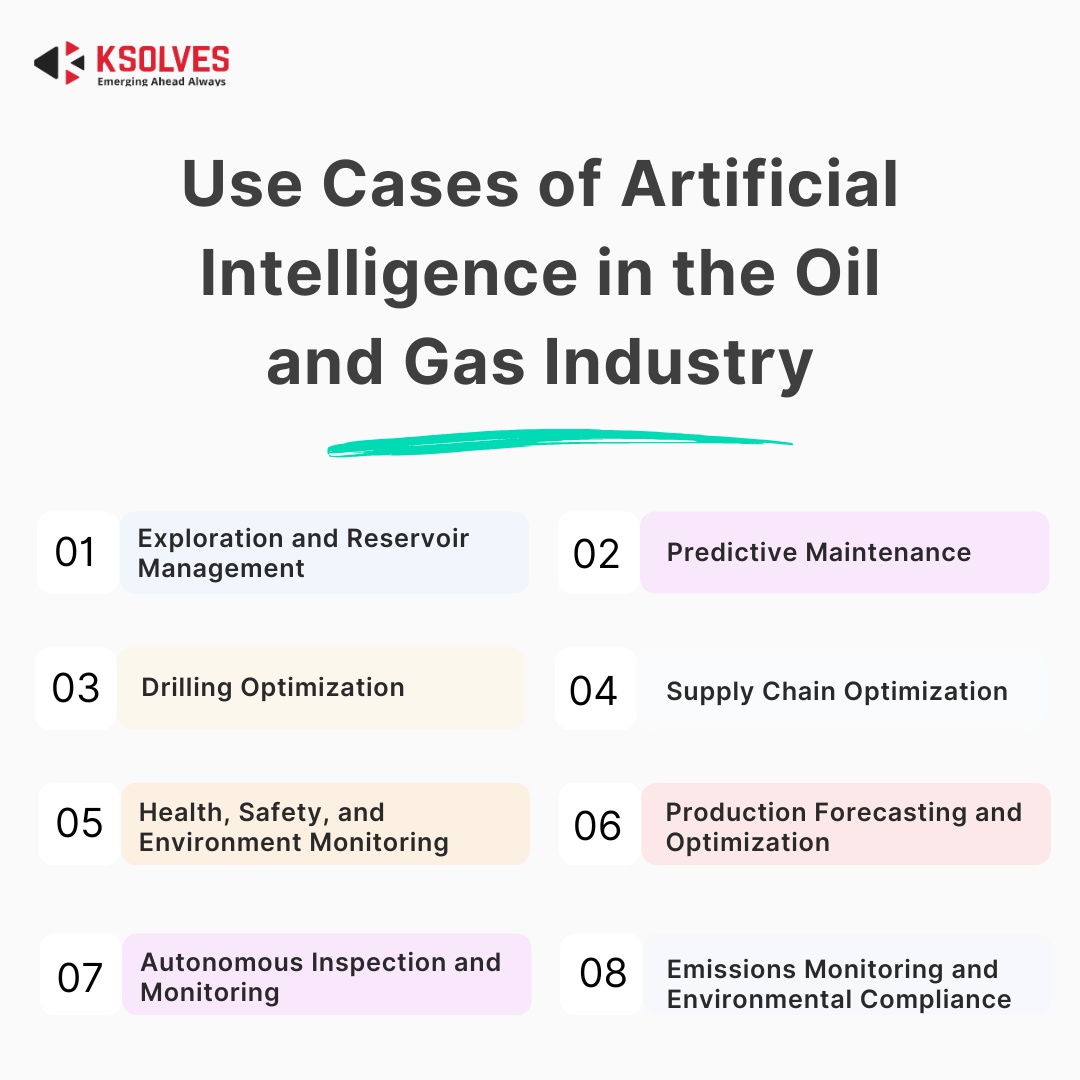
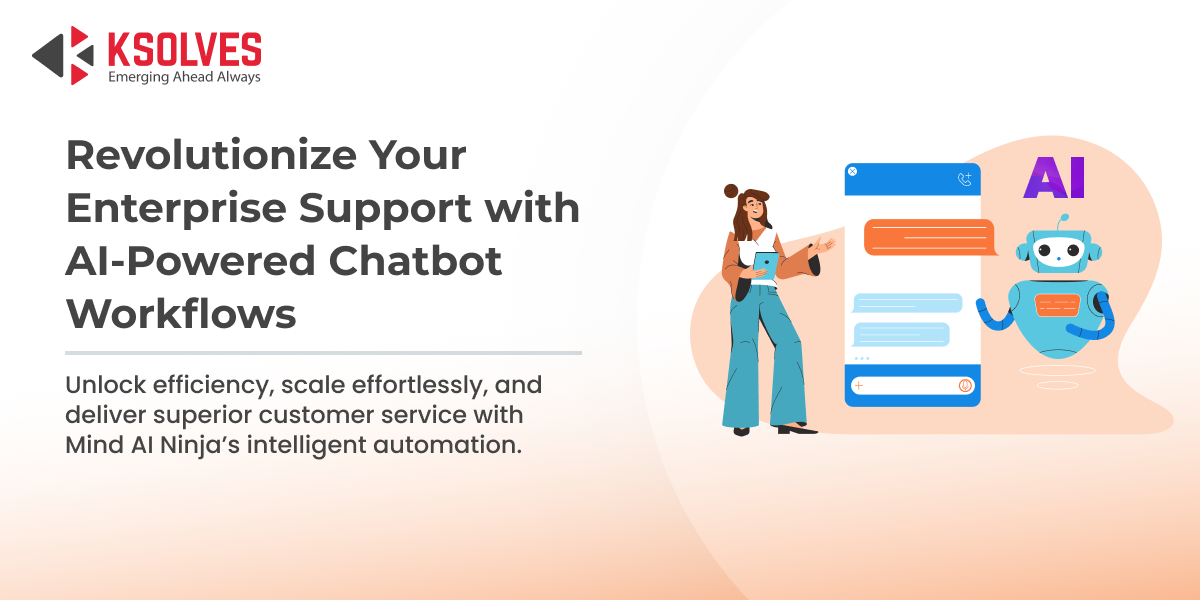
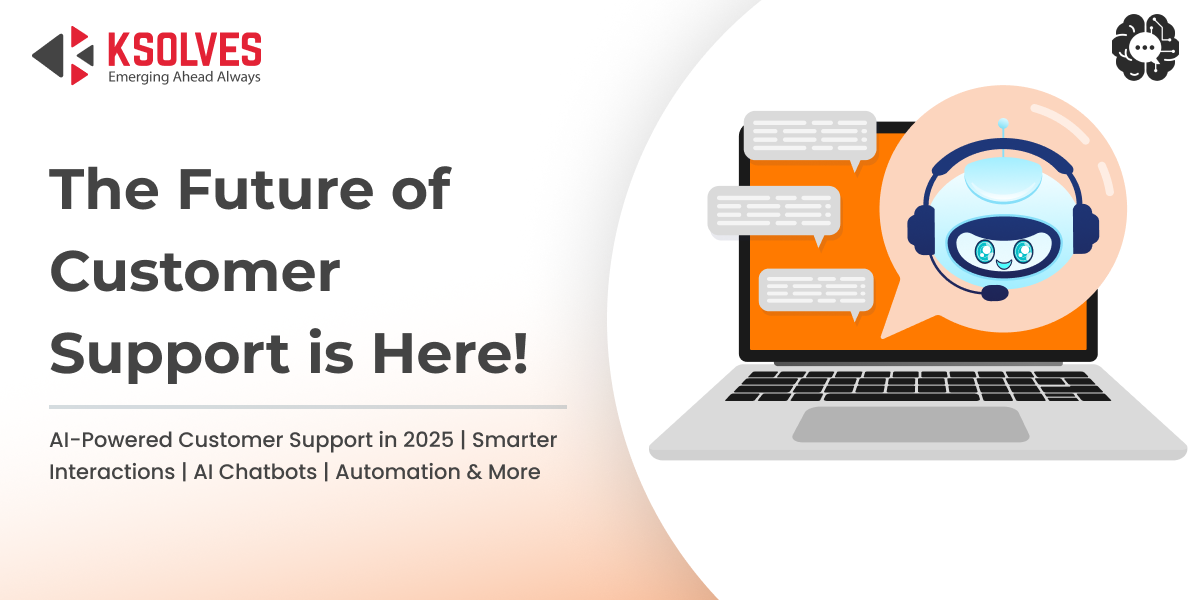
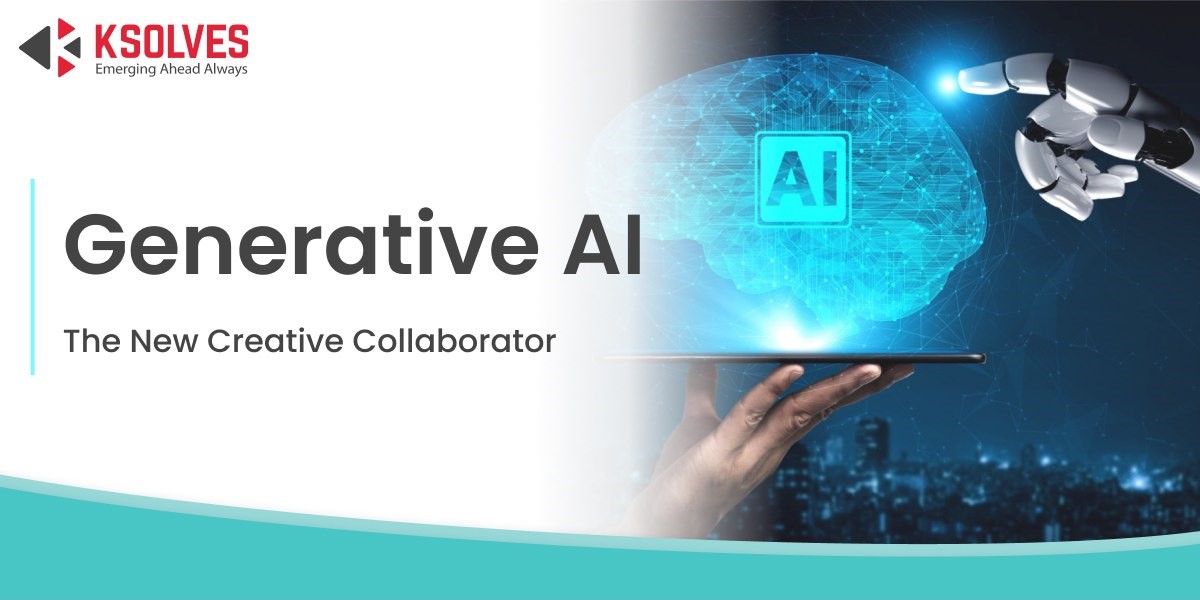

AUTHOR
AI
Mayank Shukla, a seasoned Technical Project Manager at Ksolves with 8+ years of experience, specializes in AI/ML and Generative AI technologies. With a robust foundation in software development, he leads innovative projects that redefine technology solutions, blending expertise in AI to create scalable, user-focused products.
Share with